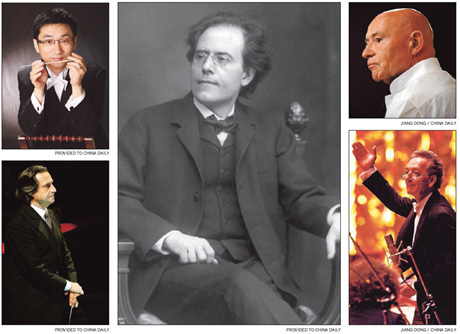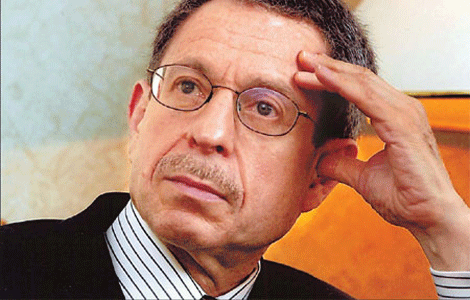Mahler's resurrection
Updated: 2011-08-30 07:51
By Mu Qian (China Daily)
|
|||||||||

|
Works by Austrian composer Gustav Mahler (center) will be played extensively at the Beijing Music Festival, under the baton of Chinese and international conductors including (clockwise from top left) Li Xincao, Christoph Eschenbach, Yuri Temirkanov and Riccardo Muti. |
The Beijing Music Festival in October is dedicated to the centennial of the death of Gustav Mahler and naturally celebrates his music. Mu Qian reports.
On April 22, 1928, Italian conductor Mario Paci led Shanghai Municipal Council Symphony Orchestra, China's first symphony orchestra, to give a performance of Lieder eines Fahrenden Gesellen (Songs of a Wayfarer) by Gustav Mahler (1860-1911). This was the first known performance of the Austrian composer's music in China. Now Shanghai Symphony Orchestra, successor to the Shanghai Municipal Council Symphony Orchestra, will perform the work again at the closing concert of the 2011 Beijing Music Festival, on Oct 30, under the baton of Riccardo Muti. It is one of the many Mahler works that will be presented at the 2011 Beijing Music Festival, dedicated to the centennial of the death of the composer.
"This is probably the first time that one single composer's output has been so comprehensively programmed in China," says Yu Long, artistic director of the festival. "It also marks Beijing Music Festival's first foray in celebrating a single composer."
Throughout the 2011 Beijing Music Festival (Oct 6-30), Mahler's symphonies and chamber music will be performed by some of the most acclaimed international and Chinese artists.
All the 10 numbered symphonies of Mahler will be played at the festival. China Philharmonic Orchestra will play Mahler's third, fourth, fifth and eighth symphonies; Shanghai Symphony Orchestra will play the sixth; Guangzhou Symphony Orchestra the second; China National Symphony Orchestra the ninth; Beijing Symphony Orchestra the 10th; and Singapore Symphony Orchestra the first and seventh.
There will also be concerts of Mahler's chamber works by the Curtis Chamber Orchestra from the United States, and the Lucerne Festival Strings from Switzerland, among others.
"I have been involved with Mahler's music since I began playing music professionally, first as a violinist, then as a conductor," says Israeli conductor Eliahu Inbal, who will collaborate with Singapore Symphony Orchestra to play Mahler's Symphony No 1 in D Major (Titan) on Oct 28.
"It was one of those meetings between composers and interpreters when you feel this music is for me. I was born to understand and interpret this music."
British conductor Daniel Harding, who will lead China Philharmonic Orchestra to play Mahler's Symphony No 4, says it's a privilege to partake in a Mahler festival that will present his music from many different perspectives.
A number of other international and Chinese conductors will collaborate with Chinese orchestras to play Mahler's symphonies, including Charles Dutoit, Manfred Honeck, Chung Myung-whun, Yuri Temirkanov, Christoph Eschenbach, Li Xincao and Tan Lihua.
The festival will open with Dutoit conducting the China Philharmonic Orchestra and a number of choral groups to perform Mahler's Symphony No 8 in E Flat Major - nicknamed "symphony of a thousand" because of the many performers it requires.
At the festival, Chinese artists will contribute by not only playing Mahler's scores, but also providing original ideas.
On Oct 23, a performance will be held at the Poly Theater, featuring Mahler's Das Lied von der Erde (Song of the Earth) and Chinese composer Ye Xiaogang's Das Lied auf der Erde, a work on the same subject but reconceived.
In addition, avant-garde stage director Li Liuyi will stage a dialogue between the two musical works from different cultural backgrounds.
For the Chinese audience, Mahler's Das Lied von der Erde has a special status because it was inspired by the works of some Chinese poets from the Tang Dynasty (AD 618-907), including Li Bai and Meng Haoran.
"The personality, uncertainty and drama of Mahler's music makes him one of my favorite composers, but how to transfer the audio effect of music into a visual presentation is a great challenge for me," Li says. "I hope the combination of music and theater won't be simply 1+1 = 2, but something more powerful."
Another somewhat unusual program of the festival is Primal Light - Jazz Riffs on Mahler, a concert of American jazz pianist Uri Caine's interpretations, based on musical materials from Mahler's first and fifth symphonies, as well as select vocal works.
It is not common for a Chinese music festival to be dedicated to a foreign composer, yet Yu, artistic director of the festival, believes that it is a natural reflection of the growth of a variety of arts in contemporary China.
"I hope the different perspectives of Mahler's music we present at the Beijing Music Festival will offer not only a commemoration of the great composer, but also an opportunity for us to reflect upon the arts and humanity as a whole," he says.
"Mahler's music has become a touchstone for symphony orchestras, and through this festival we can be introspective about the development of Chinese symphony orchestras over the past decade."
All the five Chinese orchestras participating in the 2011 Beijing Music Festival have a deep involvement with Mahler. Among them, China Philharmonic Orchestra is the first to perform a complete Mahler symphony cycle in China.
Guangzhou Symphony Orchestra launched its Mahler mission in 2003, and finished its four-season symphony cycle between 2008 and 2011. Shanghai Symphony Orchestra has been playing Mahler since 2001, with seven Mahler concerts scheduled during the 2010-2011 season.
When asked whether a festival dedicated to Mahler's works might seem too formidable to local audiences, Yu says that Mahler's music is serious but not inaccessible.
"Beijing audiences welcomed the 16-hour opera Der Ring des Nibelungen (The Ring of the Nibelung) and the contemporary opera Lulu. I think Mahler's music will be enjoyed by more people," Yu says. "In addition, the variety of the festival's program will make it more accessible."
Rob Stewart, senior vice-president of Merrill Lynch Asia Pacific, a principal sponsor of the 2011 Beijing Music Festival, says that the high quality of the program of the festival makes it a world-class event.
"Mahler is one of my favorite composers. I wasn't aware of his influence in China, and I will be very interested to find out during the festival," he says.












